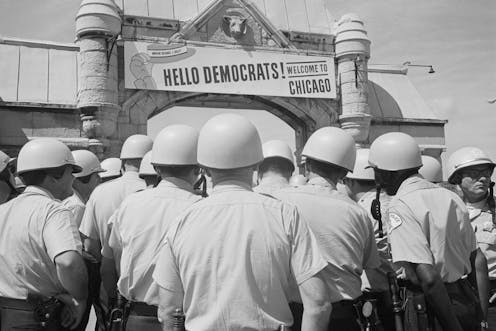Hopes that Biden will quit his reelection campaign ignore the differences – and lessons – of LBJ and 1968’s Democratic catastrophe
- Written by Philip Klinkner, James S. Sherman Professor of Government, Hamilton College
 The 1968 Democratic National Convention in Chicago was not a peaceful event.Bettmann/Getty Images
The 1968 Democratic National Convention in Chicago was not a peaceful event.Bettmann/Getty ImagesIt’s just over six months until Election Day. The president faces a tough fight for reelection. His approval rating has cratered below 40% in the polls, his party is divided over a foreign war, and a bipartisan chorus declares that he’s no...

